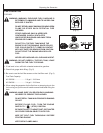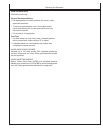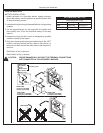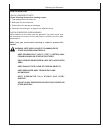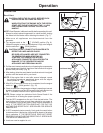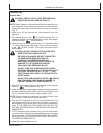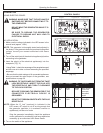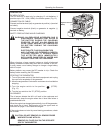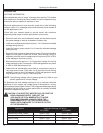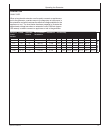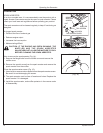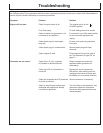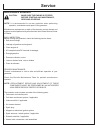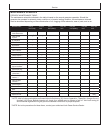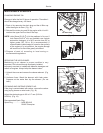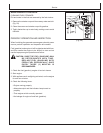
Operating the Generator
30 Operator’s Manual
Applications Applicable Wattage (W) 60 Hz
AC-G3200i AC-G4300i
Incandescent Lamp, Heater approx. 2800 approx. 3800
Fluorescent Lamp, Electric Tool
approx. 1400 approx. 1900
Mercury Lamp approx. 1000 approx. 1600
Compressor Pump approx. 600 approx. 800
OPERATION
WATTAGE INFORMATION:
Some appliances need a “surge” of energy when starting. This means
that the amount of electrical power needed to start the appliance may
exceed the amount needed to maintain its use.
Electrical appliances and tools normally come with a label indicating
voltage, cycles / Hz, amperage (amps) and electrical power needed to
run the appliance or tool.
Check with your nearest dealer or service center with questions
regarding power surge of certain appliances or power tools.
• Electrical loads such as incandescent lamps and hot plates require
the same wattage to start as is needed to maintain use.
• Loads such as fluorescent lamps require 1.2 to 2 times the indicated
wattage during start-up.
• Loads for mercury lamps require 2 to 3 times the indicated wattage
during start-up.
• Electrical motors require a large starting current. Power requirements
depend on the type of motor and its use. Once enough “surge” is
attained to start the motor, the appliance will require only 30% to 50%
of the wattage to continue running.
• Most electrical tools require 1.2 to 3 times their wattage for running
under load during use. For example, a 5000 watt generator can power
a 1800 to 4000 watt electrical tool.
• Loads such as submersible pumps and air compressors require a
very large force to start. They need 3 to 5 times the normal running
wattage in order to start. For example, a 5000 watt generator would
only be able to drive a 1000 to 7000 watt pump.
NOTE: The following wattage chart is general guide only. Refer to your
specific appliance for correct wattage.
To determine the total wattage required to run a particular electrical
appliance or tool, multiply the voltage figure of the appliance / tool by
the amperage (amps) figure of same. The voltage and amperage (amps)
information can be found on a name plate which is normally attached
to electrical appliances and tools.
CAUTION: IF AN ELECTRIC MOTOR FAILS TO START OR
REACH RUNNING SPEED, TURN OFF THE
APPLIANCE OR TOOL IMMEDIATELY TO AVOID
EQUIPMENT DAMAGE. ALWAYS CHECK THE
REQUIREMENTS OF THE TOOL OR APPLIANCE
BEING USED COMPARED TO THE RATED OUTPUT
OF THE GENERATOR.



